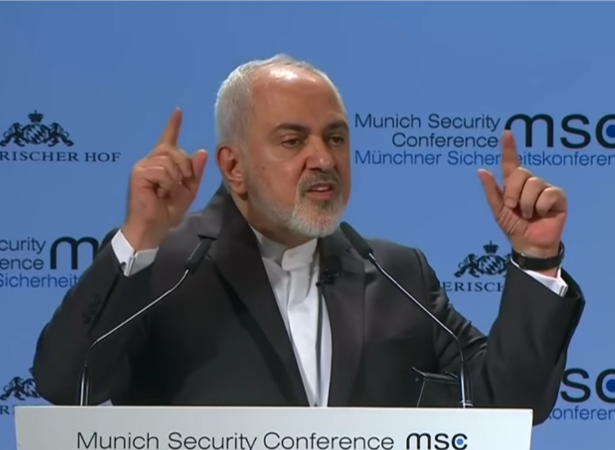Iran Economy to Shrink 9.5% in 2019 as U.S. Sanctions Bite Deeper
Washington-based IMF: Iranian regime “feels the impact of tighter U.S. sanctions.”

The Iranian economy could shrink by 9.5 percent in 2019 amid tighter U.S. sanctions, the International Monetary Fund (IMF) forecasts. The economic projection comes a month after President Donald Trump ordered the Treasury Department to “substantially increase” sanctions on Tehran.
Trump withdrew the U.S. from the Obama-era Iran nuclear deal in May 2018, placing stiff economic sanctions on the Islamic Republic. In November 2018, the White House Trump imposed more wide-ranging sanctions on Iran’s oil, shipping and banking sectors.
As a result, the country’s currency took a nosedive and inflation has risen ever since. In addition to that, the regime has lost billions of dollars in oil revenue after the November sanctions came into effect.
Washington-based IMF previously projected the Iranian economy to shrink by 6 percent in the current year. That estimate changed once the U.S. revoked the waivers in May 2019, which had allowed big oil buyers to keep doing business with Iran. “Iran suffering ‘severe distress’ from US sanctions,” British newspaper Financial Times confirmed Thursday.
Reuters news agency reported the IMF projection:
Iran’s economy is expected to shrink by 9.5% this year, the International Monetary Fund (IMF) said, down from a previous estimate of a 6% contraction, as the country feels the impact of tighter U.S. sanctions.
The IMF forecasts, published on Tuesday in the fund’s World Economic Outlook report, are not far from estimates given last week by the World Bank, which said the Iranian economy by the end of the 2019/20 financial year would be 90% of its size just two years ago.
Iran, a large oil producer, saw its oil revenues surge after a 2015 nuclear pact agreed with six major powers that ended a sanctions regime imposed three years earlier over its disputed nuclear program.
But new sanctions brought in after U.S. President Donald Trump withdrew from that deal in 2018 are the most painful imposed by Washington, targeting nearly all sectors of Iran’s economy.
The sanctions imposed by President Trump are now “inching toward economic blockade,” the U.S. based journal Foreign Policy reported recently. “Iran’s inflation is officially north of 40 percent, (…) its economy is projected to shrink by 3 to 6 percent this year, and, most importantly, the regime’s main source of revenue to fund destabilizing activities in the region has been severely curtailed,” the journal concluded.
Despite the U.S. sanctions, China and Turkey continue to buy Iranian oil. In September, Turkish President Tayyip Erdogan openly defied Trump, saying his country will not stop purchasing oil and natural gas from Iran.
China’s state-owned oil companies are perhaps the biggest violators of U.S. sanctions. Chinese drilling companies are eyeing under-explored Iranian oil fields while energy-hungry Beijing hoards Iranian oil. “Tankers are offloading millions of barrels of Iranian oil into storage tanks at Chinese ports, creating a hoard of crude sitting on the doorstep of the world’s biggest buyer,” Bloomberg confirmed in July, months after the U.S. ended the waivers.
The European Union and European leaders have also thrown lifelines to the fledgling regime. Early September, French President Emmanuel Macron offered a $15 billion worth of credits to Tehran as sanctions crippled major sectors of Iran’s state-controlled economy. German Chancellor Angela Merkel’s government has pushed for an EU-Iran trade mechanism or INSTEX as it is formally known. The multi-national payment system will enable European companies to bypass Washington’s sanctions as they trade with Tehran.
Buoyed by European diplomatic backing and Chinese cash, the regime continues to terrorize its neighboring Gulf states, home to the world’s biggest oil producers. The Islamic Revolutionary Guards Corps (IRGC), the regime’s military arm and a U.S. designated terrorist organization, has attacked foreign oil tankers in the Strait of Hormuz shipping lane, the waterway through which a quarter of the global oil supply passes. Last month’s Iran-sponsored attack on Saudi Arabia’s oil fields knocked out half of the country’s production, causing disruptions in energy markets worldwide.
President Trump: ‘Iran sanctions are working’
[Cover image via YouTube]
Donations tax deductible
to the full extent allowed by law.








Comments
People would be rioting in the streets if our economy shrank 10%.
We know the elites are never hurt but this kind of thing so no worries there but how much more will the downtrodden take?
RE: “Iran Economy to Shrink 9.5% in 2019 as U.S. Sanctions Bite Deeper”
GOOD!
Carter should have made that happen in 1978 instead of starting
his “Endless Virtue Signaling Tour” then! Snark.
Opening their nuclear development program to independent inspection was a good start; but, they need to cease and desist from sponsoring international terrorism, and, ideally, respond equitably to their people.
“Opening their nuclear development program to independent inspection was a good start…”
You trying to make a funny, n.n?